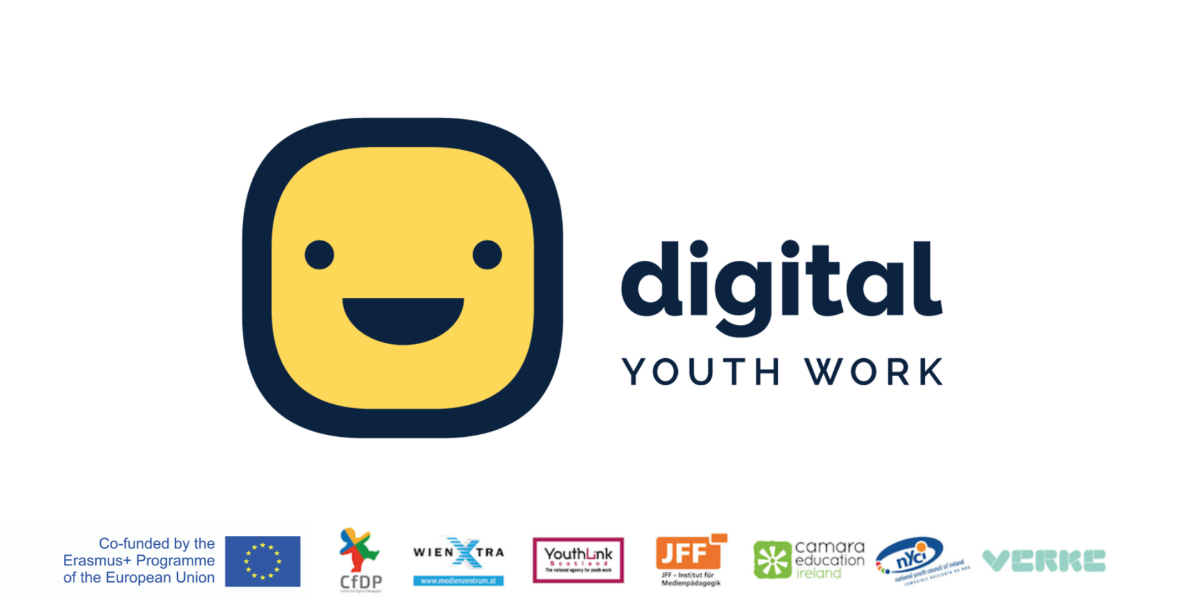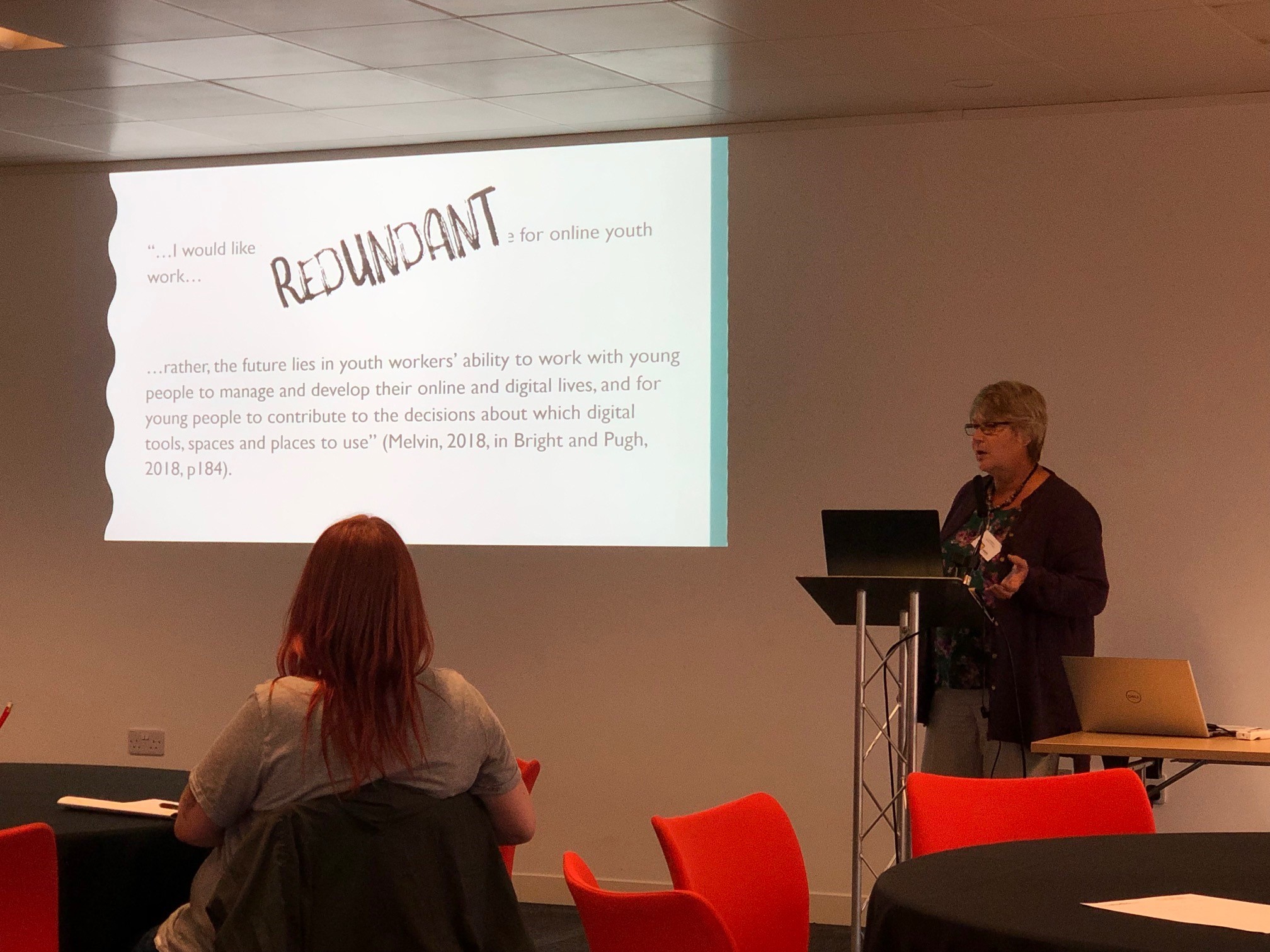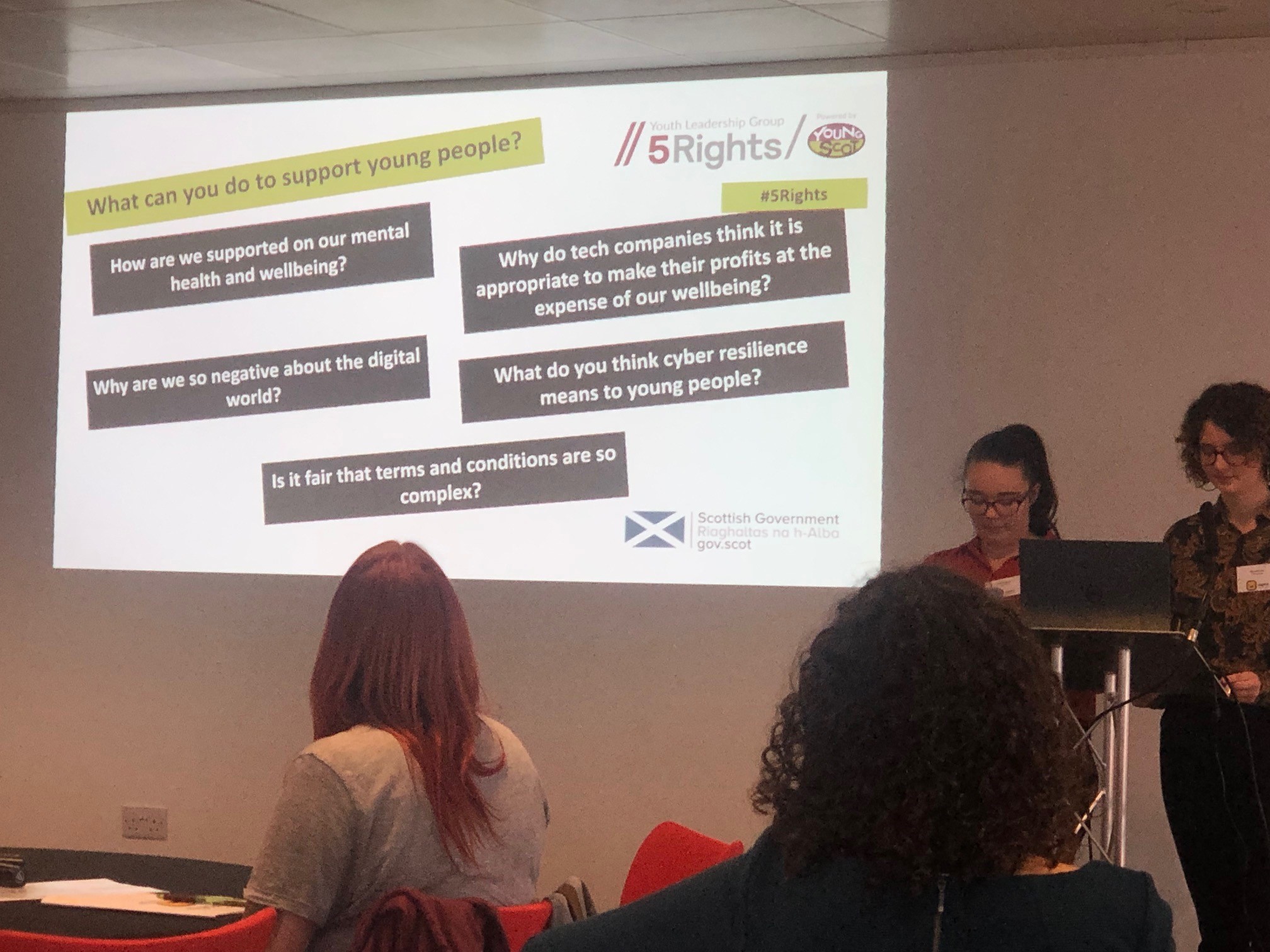
by Scott Faulds
On Tuesday 3rd September, youth work organisations from across the European Union came together in Glasgow to launch the European Guidelines for Digital Youth Work, training materials and a collection of short films showcasing Good Practice. This was the culmination of a two-year transnational Erasmus+ project, designed to foster shared understandings and inform, inspire and empower the wider youth work sector to get to grips with youth work in the digital age.
The project was conducted in partnership with YouthLink Scotland, Centre for Digital Youth Care (Denmark), Verke – The National Digital Youth Work Centre (Finland), wienXtra MedienZentrum (Austria), JFF – Institut für Medienpädagogik (Germany), National Youth Council of Ireland and Camara Education Limited (Ireland).
Keynote Speaker: Dr Jane Melvin

To kick off the conference, keynote speaker Dr Jane Melvin of the University of Brighton, spoke of her journey from technophobe to technophile and of her belief that there is no longer an option for youth workers not to embrace digital technology.
Dr Melvin argued that youth workers should utilise any tool which could allow for the better engagement of young people. She described this as the “digital hybrid approach”. This approach encourages youth workers to adopt a critical standpoint when considering the use of digital tools and actively encourages the questioning of why and when digital tools are utilised. Dr Melvin contends that it is as much about using digital tools thoughtfully as it is about deciding when not to use them.
Additionally, Dr Melvin stressed that the concept of young people being digitally literate is no longer relevant in a time where technology is advancing at an ever-faster pace. In the digital age, it is vital that young people can navigate a variety of different digital tools and be confident in adopting new technologies as they emerge. This ability to transfer existing knowledge to critically assess the best way to interact with new and emerging technology has been described as digital fluency, and Dr Melvin advocates the need for every young person to develop this fluency to enable them to thrive in the digital age.
In closing, Dr Melvin stated that for youth work in the digital age, it is essential to find a balance between conservative stability and runaway adoption, to ensure that youth workers can truly reap the benefits of the digital age.
Digital Youth Work in Scotland
As the conference was held in Glasgow, it seemed only fitting to hear about some of the work that youth work organisations in Scotland were doing to help adapt to the digital age.
We heard from Claire McGinley and Inigo Sands from Paisley YMCA, which has received awards for their digital youth work and has fostered partnerships with Microsoft, Google and the University of the West of Scotland.
Claire and Inigo began by stressing that there is no specific type of young person who will take part in digital youth work, as digital skills are vital to allow young people to access the world of work. We all access the digital world as part of our day-to-day lives and for young people there is less of a distinction between the real and online world. Therefore, is it crucial that youth workers are able to help young people develop their digital skills. This is something Paisley YMCA has had a great deal of success at with, through fostering a good environment for ‘stealth learning’.
Paisley YMCA has a maker space, a STEM for girls’ club, coding dojo and are able to adapt to the needs of young people as new digital tools emerge. However, it is not simply about young people becoming experts at using a 3D printer; the activities offered by Paisley YMCA are about giving young people an opportunity to try new things.
Claire and Inigo concluded that there is no secret formula to digital youth work; you just have to do it, and be open to the opportunity for vertical learning.

We also heard from representatives from the Young Scot 5Rights Young Leaders, who spoke of their work to promote the five digital rights for young people, which were based on the United Nations Convention on the Rights of the Child. The five rights are:
- The right to remove
- The right to know
- The right to safety and support
- The right to informed and conscious use
- The right to digital literacy
The Young Scot 5Rights Young Leaders presented the Scottish Government with their report, Our Digital Rights, which featured 20 recommendations of how the Government can best support the protection of these rights. Recommendations included the integration of digital literacy across all school subject areas, the ability to limit the unnecessary collection and use of young people’s data and the provision of greater internet access in rural areas of Scotland.
The Scottish Government accepted the recommendations of the report and the Cabinet Secretary for Culture, Tourism and External Affairs, Fiona Hyslop, has agreed to keep the 5Rights Young Leaders involved during its implementation. The 5Rights Young Leaders concluded by voicing their desire for Scotland to become a leading example of how young people and children can benefit from the digital age without having their safety and privacy compromised.
Good Practice
One of the key aims of this Erasmus+ project was the facilitation of the exchange of good practice and knowledge across the European Union. At the conference, we had an opportunity to hear from each of the partner organisations and learn about the work they were doing in their respective countries. The Digital Youth Work website features a collection of videos featuring Good Practice, as well as an extensive library of training materials.
One particularly interesting example was the online counselling services offered by Denmark’s Centre for Digital Youth Care, who operate three tailored online services.
- Cyberhus – a general forum for young people aged between 9 and 23 years old
- Mitassist – focused on young men and utilises gamification to keep them engaged
- Netstof – focused on discussing drug and alcohol problems for young people aged between 15 and 24 years old
These services offer a space for young people to seek advice and discuss problems anonymously, either with their peers on the moderated forum or with qualified social workers. Cyberhus has 40,000 unique visitors each month and the top three issues regularly discussed are self-harm, eating disorders and relationships. The number of regular users and the type of issues discussed can be challenging for staff, who all have to complete a twelve-week course before working on the platform.
The Centre for Digital Youth Care view this service as vital in helping support young people in Denmark. The anonymity these platforms provide is often attractive to young people, with the vast majority not wishing to provide social workers with their location or confirming if they are already in touch with a professional treatment provider. Anni Marquard, the creator of Cyberhus, believes that youth workers must be willing to adapt to allow them to engage with young people. After all, 88% of all visits to Cyberhus are from smartphones. The use of digital tools to enable anonymous online counselling has enabled young people across Denmark to access support when they need it most and the platforms regularly provide more counselling sessions than their real-life counterparts. Thus, it is clear that youth workers must be ready to adapt to the digital age in order to best engage young people.
Final Thoughts
The conference demonstrated that a great deal of work has been done by organisations and countries across the European Union.
The ability to exchange good practice and knowledge from youth workers across the EU enabled everyone to gain a new perspective on how to approach the implementation of new digital tools and was aided by the format of the conference which encouraged networking and dialogue.
The basis of this transnational Erasmus+ project was the exchange of good practice to enable youth workers across Europe to harness the tools of the digital age to better support young people.
Through the production of the European Guidelines for Digital Youth Work, Good Practice videos and training materials, it is clear that not only has this project been a success, but it has resulted in the creation of a powerful and effective resource that can empower youth workers across the world to meet the challenges of the digital age.
The Knowledge Exchange provides information services to local authorities, public agencies, research consultancies and commercial organisations across the UK.
Follow us on Twitter to see what developments in policy and practice are interesting our research team.
Share
Related Posts
Supporting residents on the decarbonisation journey: leveraging data for effective retrofit projects
As the drive towards decarbonisation intensifies, the social housing sector’s ability to collect, store and manage vast amounts of data becomes increasingly critical. With a shared goal of creating warmer, carbon-free homes, housing associations’ strategic use of data is essential ....
A recent item on BBC Radio 4’s Today programme generated an unusually high number of responses from listeners. A man who had lost his job in the financial services sector at the age of 57 described his difficulty in trying ....
By Donna Gardiner While free school meals (FSM) have been available in England on a means-tested basis since 1944, recent years have seen a renewed focus upon the potential benefits of providing free school meals to all school-aged children. Currently, ....
By Robert Kelk and Chris Drake A new start for an old challenge? The recent appointment of Marc Lemaître as the European Commission’s director general for research and innovation (R&I) has returned Europe’s R&I gap to the spotlight. Previously head ....
